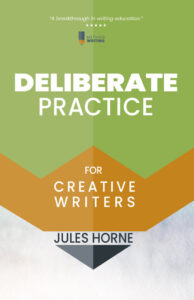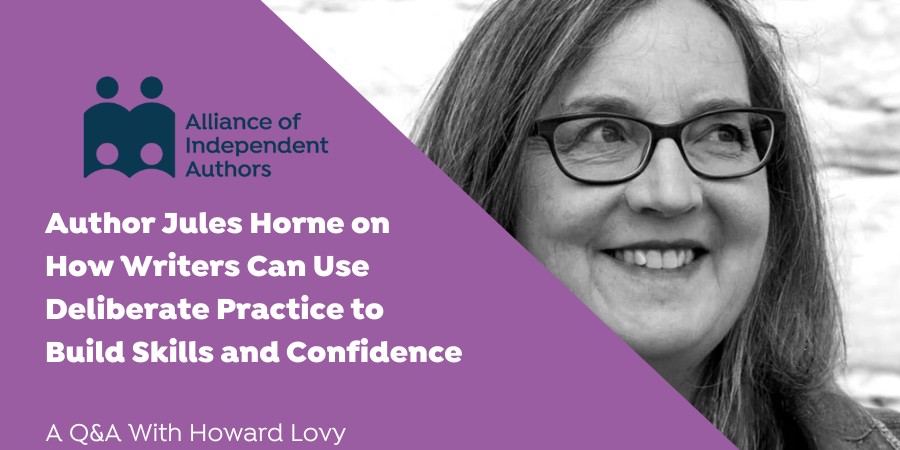I'm more of a pantser—someone who figures things out on the page rather than planning every move. But when I heard that Scottish author and writing coach Jules Horne had applied the concept of deliberate practice—something musicians and athletes have used for generations—to writing, I was intrigued. Her book, Deliberate Practice for Creative Writers, argues that focused, bite-sized exercises can help writers build their skills more efficiently than just grinding through another draft. In this Q&A, I ask her how it works, how she uses it herself, and how writers like me might apply it without giving up spontaneity.
You’re both a writer and a musician. Can you tell me a little more about your creative background and how it led you to this idea of deliberate practice for writers?

“So that skill of deliberate practice – breaking things down to master a technique – is a well-established training foundation in music, sports, chess, dance and even visual art. So, it’s completely normal to me.” — Jules Horne
Like many Scottish writers, I grew up with the oral tradition, where there's a lot of overlap between writing, performing poetry or song, and playing music. So, learning an instrument isn't that unusual, and in that world, you practice. Practice means a mix of technique and your current piece in progress – usually a tune for performance. So exactly as in sport, you limber up with scales, arpeggios, stretching. Then a technique you want to master – maybe string-crossing on the bow. Then you play that in context, in your performance piece. And you repeat the difficult bits, not the easy bits!
So that skill of deliberate practice – breaking things down to master a technique – is a well-established training foundation in music, sports, chess, dance and even visual art. So, it’s completely normal to me.
Meanwhile, I taught creative writing for many years with The Open University. Feeding back on student work, the same issues came up over and over again. Students were getting feedback on every dimension at once. In among the interesting stuff about voice, style, character, story – the distinctive qualities of every writer – were foundational craft techniques which they’d never been taught. To me, it would be more effective to put some solid craft foundations in place first, before drafting an 80k novel, then getting a mountain of feedback.
I've also been trained in different writing professions – journalism, editing, script development. Writers in those professions do get training, and do small pieces before getting let loose on long-form. And crucially, there’s a short feedback loop. No way would you spend ten months on a long piece, put your work out in public, and get feedback on every dimension at once.
So, to me, it's a big gap in writer training. Plus, deliberate practice has helped me to improve faster, and I thought it could help a lot of other writers, too.
You point out that musicians, athletes, and dancers all train in small, repeatable skills—but writers often don’t. Why do you think that gap exists?
I’m not entirely sure! I think historically, books were written by people who did practise – people brought up with rhetoric, grammar, beautiful handwriting within formal learning. And before that, oral storytelling depended on practice and repetition, using poetic devices that were structured and memorable. Whereas nowadays, there’s often a feeling that writing is pretty well the same as speaking, just with a keyboard. So, if you can speak, you can write well. But spontaneous speaking and writing for publication are very different. Writing for publication is more like a performance – getting up, taking a stance, and presenting it to people. Very few of us get up and present our spontaneous spoken meanderings! But we’ve got used to that ease in presenting writing that probably needs more work. I think changes in technology also play a role in this. We don’t use precious paper and ink and send carefully crafted letters to each other. We're whirring out words on the keyboard, sometimes even getting computers to whirr them out for us. Plus, writing is relatively isolated. If you do something collaborative or communal such as music or dance, you’re exposed to audience and peer feedback, and learn more quickly.
When did you first begin applying these ideas to your own writing? Was there a turning point or a project where it made a big difference
I’d had a few early successes, including getting a radio play produced by the BBC. I then got professional script editor feedback, and realised I had no idea what I was doing! There was a whole world of concepts and terminology I’d never encountered, even though I devoured writing books. Industry people knew this stuff, and I was a very obvious naive newbie. I started reading scripts and taking notes, to gather techniques. I even did a Shakespeare course with the OU and read the plays as a writer, scribbling notes in the margins – aha, that’s what you’re up to! It has been extremely useful ever since. And I still read and watch films and TV with a writer’s eye, learning techniques all the time. I’m not alone, among professional writers I know.
Later, I tried deliberate practice with students I was teaching. We worked on the beats of a script, and everyone wrote different versions in their own words. It was a revelation. Every script was different, set in different worlds and with different characters, different pace and rhythms. But you could feel the underlying emotional structure, way beneath the words.
More recently, I was working with a writer struggling with the end of her work in progress. I suggested she analyse the ending of a play we’d been looking at. She worked out the beats, emotional shifts, use of metaphor – the techniques the writer was using. She wrote her own ending, very different, but using some of the techniques. We read it in our writers’ group, and it was amazing – moving, assured, a beautifully poised moment. I think scales fell from everyone’s eyes at that moment.
I tend to be more of a pantser—I don’t outline much and follow where the characters lead. How can writers like me use deliberate practice without losing the spontaneity?
You can be playful, and build it into what you do anyway. It’s really about building your toolkit. So, if you watch films in your spare time, turn detective. Keep your notebook beside you and note examples of techniques. For example, you could choose a focus on exposition and note the cunning ways (or clunky) writers sneak in exposition. You can learn a lot from this. Or if you’re reading your favourite writer, choose a page that particularly chimes with you, and close read. How is it making you feel? Why? What language jumps out, and why? Read it aloud. Feel how the is writer handling pace, rhythm, landing words at the end of sentences. Look out for metaphors, sensory language. Identify what techniques are in play. Then use this insight to write your own sentences, compare and reflect.
If you use any kind of warmup, such as morning pages, choose a focus instead of a random prompt. I often use ‘ask the character’ – characters usually know far more than I do! Or try a language technique, and feel its effect – all-active or all-passive verbs, for example.
I once did a 100-day experiment of writing stories in five minutes, from random prompts from my bookshelf. This was to understand resistance and feel structure taking shape as I wrote. These were published as Nanonovels, and I still use this technique sometimes – it’s always a surprise and a joy to see what your bookshelf turns up!
You talk about short feedback loops as a better way to address recurring issues than just waiting on full manuscript critiques. What’s a practical way for writers to build those loops into their process?
Authors don’t have the luxury of small feedback loops from an external editor, so you have to nurture yourself. A routine, a short timespan and a tight focus helps. Usually, I choose just a paragraph from a book and mark it up. I often buy second-hand book copies just to scribble on them!
If you’ve had general craft feedback and can identify an issue to tackle, analyse some examples from writers who handle it well. Early in his career, Louis de Bernières (Captain Corelli’s Mandolin) reportedly got poor reader feedback on his characterisation and took steps to improve it. I’d probably tackle this by choosing memorable examples from books I love, then close reading to find out how the writer did it. One technique you begin to spot a lot is a leitmotif or signature object, sound, perfume, or garment associated with the character. Dorothy’s red slippers in The Wizard of Oz are a classic example. You could write paragraphs to try out different leitmotifs, and brainstorm different ways they can appear, and be transformed, in your story. Then, as a feedback loop, reflect on what you’ve learned, and make notes. Reflection is essential, as it forces you to process the learning, and remember it. A deliberate practice notebook also turns into a collection of inspirations over time.
If you’re focusing on language techniques, break the element down as small as possible – just as you’d do in music or sport. Maybe you’re looking at how writers handle the passage of time and move to new scenes. So, you close-read for sentences with time signals and temporal language. Strip out the details and look at the structure. Then write a page of sentences with that same structure, and reflect on what you’ve learned.
You include some unconventional techniques in the book—like blackout writing and visual tools such as mind maps or your Textvizz app. What’s the value of seeing writing through a more visual or experimental lens?
Experimental techniques are playful, fun, and low stakes. They also refresh your perspective and give a useful jolt to your brain. If you’re running on empty, seeing things sideways can sometimes mysteriously make things click.
In terms of visual tools, I use them firstly because text is flat. I can make features stand out using highlighting or my Textvizz app. This makes it easier to see structures going on below the surface. You can also use visual tools to see other structures: timelines, viewpoint shifts, scene length. One of the difficulties of writing is that you’re operating at different scales at the same time – helicopter view of a whole story, scene level, and close-up sentence structure. Looking down on a character’s journey by mapping its rise and fall on a roll of wallpaper on the floor gives you the detachment you need to make structural decisions. It’s hard to do this when you’re deep in word and sentence level.
Let’s say someone’s in the middle of a big project and doesn’t want to change course. What’s a good way to begin using deliberate practice without losing momentum?
 Keep going with your project and fit in five minutes a day to close-read a paragraph from a favourite author. It’s a bit like a mindfulness practice where you’re learning a different way of seeing. It sensitizes you to technique and craft, and you start to get your eye in. Do it regularly and it’ll keep that part of your brain ticking, just as a daily wall-push will maintain some muscle tone! I’m a fan of B.J. Fogg’s Tiny Habits and feel strongly that habits don’t need to be huge and demanding to make a real difference. So just start, in a small way. It will feed in without you noticing.
Keep going with your project and fit in five minutes a day to close-read a paragraph from a favourite author. It’s a bit like a mindfulness practice where you’re learning a different way of seeing. It sensitizes you to technique and craft, and you start to get your eye in. Do it regularly and it’ll keep that part of your brain ticking, just as a daily wall-push will maintain some muscle tone! I’m a fan of B.J. Fogg’s Tiny Habits and feel strongly that habits don’t need to be huge and demanding to make a real difference. So just start, in a small way. It will feed in without you noticing.
What kind of response have you had so far to the book—from writers, students, or peers? Has anything surprised you?
I’ve had good response, especially from students who have seen the techniques being used in practice. Which makes sense, given that it’s a visually oriented method. I’ve heard from MA students who have used techniques I’ve shared from my own deliberate practice. To get the visual aspect across, I’m also developing a course, and the app is being used by beta testers. Occasionally, I’ve been surprised by writers not being interested in language or close-reading favourite authors, as you can very quickly pick up powerful techniques for your own toolkit. It might be down to how it’s taught in schools! As a linguist, I tend to see language as this shimmering landscape with features that jump out once you get your eye in. I can really relate to the film Arrival, and the excitement of making discoveries about a writer’s style and language – and it’s an easy skill which is open to all stages and genres of writer.
Where does AI and generative text fit into all this?
It fits in well, because I think that in education, we’ll see a swing away from text production to a focus on text analysis and commentary. If kids can whisk out 50k words before breakfast on their computers, production is no longer a valuable skill. If they learn about technique, they’ll learn better communication and will also learn about the tactics used to excite, delight, alarm and manipulate them through the written and spoken word. Language also gives you insights into psychology and people’s mental landscapes – especially the use of metaphor. And above all, exploring and playing with language is creative and individual. Distinctive, original language will become more prized, an indicator of care and quality, and a powerful statement amid the homogenized language increasingly around us. That’s my hope!
Thoughts or further questions on this post or any self-publishing issue?
 If you’re an ALLi member, head over to the SelfPubConnect forum for support from our experienced community of indie authors, advisors, and our own ALLi team. Simply create an account (if you haven’t already) to request to join the forum and get going.
If you’re an ALLi member, head over to the SelfPubConnect forum for support from our experienced community of indie authors, advisors, and our own ALLi team. Simply create an account (if you haven’t already) to request to join the forum and get going.
Non-members looking for more information can search our extensive archive of blog posts and podcast episodes packed with tips and advice at ALLi's Self-Publishing Advice Center.




